
Hi ! Today, I’ll share, step-by-step, how you can apply to US Universities for absolutely FREE through the Common App Fee Waiver. I will tell you exactly how I applied to twelve American universities (namely MIT, Stanford University, Amherst College, NYU Abu Dhabi, Brown University, Columbia University, Cornell University, Dartmouth College, Harvard College, Princeton University, University of Pennsylvania and Yale University) without paying a single cent and how you can do the same for up to twenty universities. So without further a ado, let’s dive right in.
Fee Waiver for Foreign Universities
Now, before we talk about the US College application process and how you can save hundreds of dollars in application fee. I would like to answer one of the most asked questions that you guys have, which is How to get the application fee waived for Canadian universities esp. University of Toronto which requires 180 Canadian dollars to apply.
The answer is really simple, University of Toronto, like most foreign universities in Canada, UK, Australia and Europe, does not offer application fee waiver to international students or even domestic students, so there is no other option but to pay the application fee from your pocket or ask any external organization like a non profit or education trust in your area or country to help you pay it.
When I applied to University of Toronto last year, even though the application fee was financially burdensome for me, I had no other choice but to borrow money to pay the application fee.
Now, if you are thinking of applying to US Universities, let me tell you that you’ll not just be overwhelmed with the ton of requirements from writing essays upon essays to submitting your standardized test scores, but you’ll also find that with the completion of each step in the application process, you’ll be charged a fee.
And soon these small payments will turn into hundreds if not thousands of dollars in the process. You’ll find that there is not just the application fee to apply to universities but there is fee to send your financial aid application aka CSS Profile, there is also a fee to report your standardized tests scores including SAT or ACT and TOEFL or IELTS.
But the good news is that most American universities are much more generous and considerate compared to other foreign universities and they eliminate and waive most of these costs for students you genuinely cannot afford to pay them including international students.
Application Fee
Ok, let’s talk about the first cost in the US College application process, which is the cost of applying or Application Fee.
The application fee is charged by universities and colleges when you apply to their institution. Each college has its own charge, in general, it ranges from $0 to a $100, which means that some colleges do not charge an application fee when you apply but most of them do.
According to U.S. News, the average application fee of 62 U.S. Universities which includes all the top-ranked US Universities is about $78. Now, imagine applying to twelve of these universities, it would end up costing you more than $900 in just the application fee.
When I was applying to U.S. universities last year, this was exactly the problem I faced. I was planning to apply to twelve universities including MIT, Stanford University, Amherst College, NYU Abu Dhabi and all the Ivy League schools and you know what? Just the total application fee for these twelve universities was coming out to be $930 or approximately 70,000 INR. This is the breakdown of each university’s application fee.
| University/ College | Application Fee |
| Massachusetts Institute of Technology | $75 |
| Stanford University | $90 |
| Amherst College | $65 |
| New York University Abu Dhabi | $80 |
| Brown University | $75 |
| Columbia University | $85 |
| Cornell University | $80 |
| Dartmouth College | $80 |
| Harvard University | $75 |
| Yale University | $80 |
| Princeton University | $70 |
| University of Pennsylvania | $75 |
Then after researching about eliminating this application fee, I got to know about application fee waivers where if you met certain eligibility requirements you can apply to colleges without paying the application fee.
School-Specific Fee Waiver
Now, there are two types of application fee waivers in the US College applications.
1. School-Specific Fee Waiver and 2. Application Portals’ Fee Waiver
As the name suggests, school-specific or university-specific fee waivers are institutional fee waivers granted to eligible students from a specific university. These fee waivers can only be used to apply to that university and not others.
Now, as these fee waivers are school-specific, their requirements and eligibility criteria are also specific to the university. For instance, Amherst College has two school-specific fee waivers.
1. Access to Amherst Fee Waiver and 2. Quick Pass Fee Waiver
The Access to Amherst Fee Waiver is for students who attend Amherst’s A2A or Access to Amherst Program which is one of their diversity outreach programs while the Quick Pass Fee Waiver is for all students who demonstrate financial need and it can be obtained by filling the Amherst Quick Pass Application form.
So Yeah, school-specific fee waivers are very specific to the school and sometimes specific to a group of people. For example, NYU has a school-specific fee waiver for United States Military Veteran.
Therefore, research and see if the universities you are applying to offer any school-specific fee waivers which you might be eligible for and apply to them. Also, be sure to read and properly understand the fee waiver requirements and policies before applying to them.
Common App Fee Waiver
The second type of fee waiver is the Application Portals’ Fee Waiver.
In the U.S., there are various application portals which make it easy for students to apply at multiple universities through one platform and these portals have their own fee waivers that allow you to apply at any university, from their platform, for free.
Let’s talk about the most popular one, Common App.
For those of you who don’t know much about it, Common App is an undergraduate university application website where you can apply to multiple universities in the U.S. and 20 different countries by filling a single application. Almost all students use Common App to apply to American institutions, but there are other platforms as well like the Coalition Application and Universal College Application which are less popular platforms, yet alternatives to the Common App.
I would definitely recommend you to use the Common App, since the other platforms do not have a lot of free resources for guidance and sometimes they charge you extra fees with every additional application you fill out, so yeah go ahead with Common App.
Now, Common App is a non-profit organization and it offers its own application fee waiver to make sure that the application fee isn’t a barrier or financial burden to prospective students.
The great thing about the Common App Fee Waiver is that it’s a general fee waiver which means that if you receive the Common App fee waiver, it will waive the application fee of any college you apply to, through the Common App. And you won’t be asked to pay the application fee for up to 20 colleges.
Now, you might be thinking that what is the need of the school-specific fee waivers when you can get a common app fee waiver and apply to as many as 20 colleges for free? Yea, you’re right, in most of the cases, students do not need to apply for school-specific fee waivers because if you’re eligible for the Common App Fee Waiver, you don’t need to pay the application fee for all the colleges on your College List. But again, it’s nice to know all the options you have at your disposal before you apply.
Eligibility Criteria
Ok, let’s talk about the eligibility criteria because not everyone can receive the Common App Fee Waiver as it is based on financial need and your ability to pay the application fee without it burdening your family.
According to the Common App, the fee waiver is only given to students who qualify based on different, quote unquote, ‘indicators of economic need’. Basically, there are 8 different guidelines set by the Common App and meeting any one of them will qualify you for the Common App fee waiver.
Ok, let’s go over each of them, one-by-one, starting with the first one.
You have received or are eligible to receive an ACT or SAT Testing Fee Waiver
Now, the SAT or ACT Testing Fee waiver is only offered by the College Board to U.S. citizens and international students residing in the U.S. and if you are someone who has already received an ACT or SAT testing fee waiver from the College Board, you can choose this option. However, if you are an international student who reside outside the US, which is almost everyone, you can’t chose this option.
Alright, the second criterion is
You are enrolled in or eligible to participate in the Federal Free or Reduced Price Lunch Program (FRPL)
In the US, low-income children are eligible to receive reduced-price or free meals at school and if you’re someone who is part of the National School Lunch Program in America, you can select this option but again, international students are not eligible for US Governmental Programs and so this eligibility criterion is ONLY applicable for U.S. Citizens not international students.
Third option,
Your annual family income falls within the Income Eligibility Guidelines set by the USDA Food and Nutrition Service
Now, every year, the United States Department of Agriculture (USDA) sets Income Eligibility Guidelines for schools, institutions, and government facilities to help them determine which families and children are eligible for free and reduced price meals from the US Government.
On the USDA Website, you can find the Income Eligibility Guidelines for each year (See Below 👇). For the year 2021 to 2022, if your family has 4 members and you’re earning less than $49,025 then you’re eligible for US School lunch program as well as the Common App fee waiver.
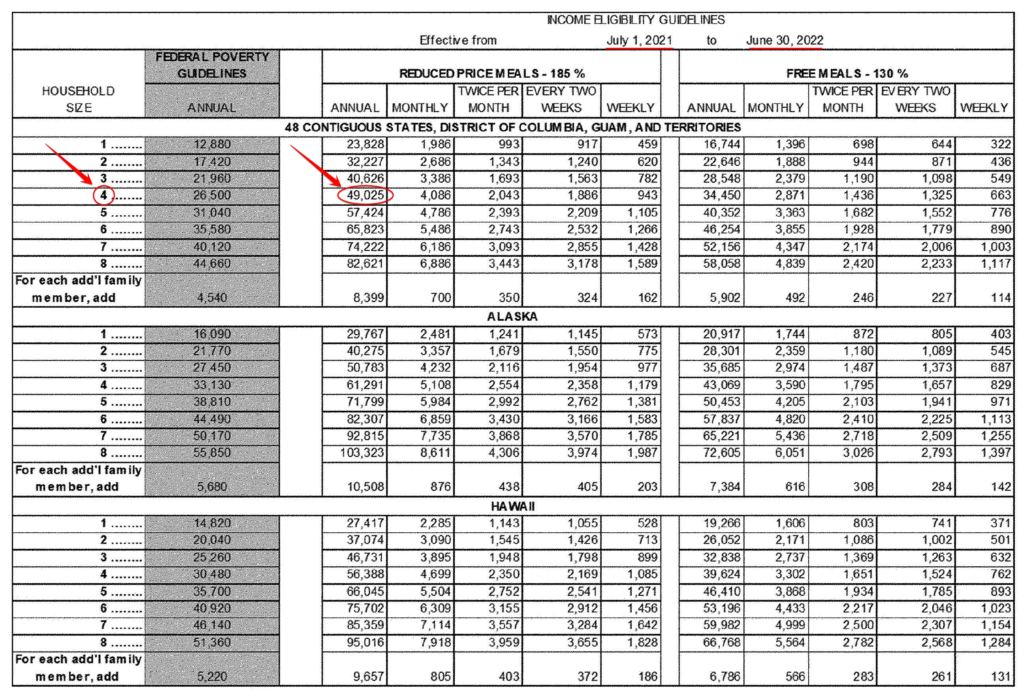
But again this eligibility criteria is very specific to U.S. States and Territories, so International Students cannot chose this option.
Next criterion,
You are enrolled in a Federal, State, or Local Program that aids students from low-income families (e.g., TRIO programs such as Upward Bound)
Again, this statement is talking about federal, state and local programs that come under the US government and are specific to U.S. citizens and residents only. Hence, International students cannot chose this option as well.
Ok, fifth criterion.
Your Family receives Public Assistance
Now, in general, public assistance means that a government or state pays money to people who are poor, unemployed or sick in the country. Now, this statement can mean public assistance offered by the U.S. government or public assistance from any other country’s government. It isn’t exactly clear whether Common App means public assistance from U.S. government only or other country’s public assistance is also included.
Now, if you are someone who receives public assistance directly from the US Government, go ahead and chose this option, but if you are an international student and you receive some form of aid from your country’s government, I would suggest you to be on the safe side and not chose this option unless none of the eight eligibility criteria applies to you.
Alright, moving onto the next criterion.
You live in a Federally Subsidized Public Housing, a Foster Home or are Homeless
Like the previous statement, there is the same ambiguity here. It isn’t exactly clear whether this includes international students who live in public housing, foster home or are homeless in their country.
Again, if you live in government subsidized housing or foster home in the US or you’re homeless in the US, you can straight away chose this option. However, if you are an international student and this option applies to you in your country, I would recommend you to not chose this option unless ONLY this option applies to you out of all the 8 criteria.
Ok next criterion,
You are a Ward of the State or an Orphan
Again, the same US and Non-US ambiguity in the word “state.” If the word “state” is only referring to the US, then this can be a tricky option for international students. Therefore, yet again, if you’re an international student chose this option only if none of the eligibility criteria applies.
Moving onto the last eligibility criterion and this is the savior for international students.
This is the criterion I chose when I applied to twelve Top American universities for free and as far as I know majority of the international students who request the Common App Fee Waiver chose this option. I hope you too can chose this option and avoid the ambiguous statements above. The criterion is:
You can provide a Supporting Statement from a School Official, College Access Counselor, Financial Aid Officer, or Community Leader
Basically, this statement means that your school official, college counselor, financial aid officer or community leader can attest to your financial need and can provide a supporting document or letter that paying the application fee will be a financial burden for you and your family. They can also attest that not getting a fee waiver can deter you from applying to the universities because paying the application fee will pose a financial hardship.
Don’t worry, if you chose this option, in most of the cases, you will not be asked to provide the supporting statement as long as your school counselor or school official verifies and confirms your eligibility.
Actually, no matter what option you chose, if you request the Common App fee waiver, your school counselor or school official will have to verify that paying the application fee will be a financial burden for you.
On their Common App Portal, they will be shown the same 8 eligibility criteria or ‘indicators of economic need’ for Common App Fee Waiver Eligibility, in a little bit different wording, and will be asked to confirm that you are eligible for the fee waiver by choosing the option that applies.
Now, filling out the Common App Fee Waiver and getting it verified from your counselor does not guarantee that you will receive the Common App Fee Waiver. In 99% of the cases, Yes it does but it is important to remember that Common App Fee Waiver is a fee waiver request and it is up the universities to approve or decline your request based on various different factors in your profile.
Mostly, if you request the Fee waiver and your counselor approves it based on the eligibility criteria, you’ll receive the Common App Fee Waiver but if the university or college you applied to feels that you aren’t eligible for a fee waiver based on your personal details and profile, they may ask you to provide the supporting statement or extra information to prove that you qualify for the fee waiver.
In my case, I chose the last eligibility criteria and my counselor did the same. I was able to submit my application to twelve institutions for free and none of them declined my fee waiver request or asked me to pay the application fee.
Therefore, read the eligibility criteria carefully and see whether your financial circumstances can qualify you for the Common App Fee Waiver. If they do, then go ahead in requesting the fee waiver and asking your counselor to verify your need.
How To Apply
Ok, now I’ll tell you exactly How you can Request the Common App Fee Waiver Step-by-Step.
It’s really easy to request the Common App Fee Waiver if you understand the eligibility criteria I mentioned above. Ok, let’s start.
Step 1: Register on the Common App.
Go to commonapp.org and create a Common App Student Account.
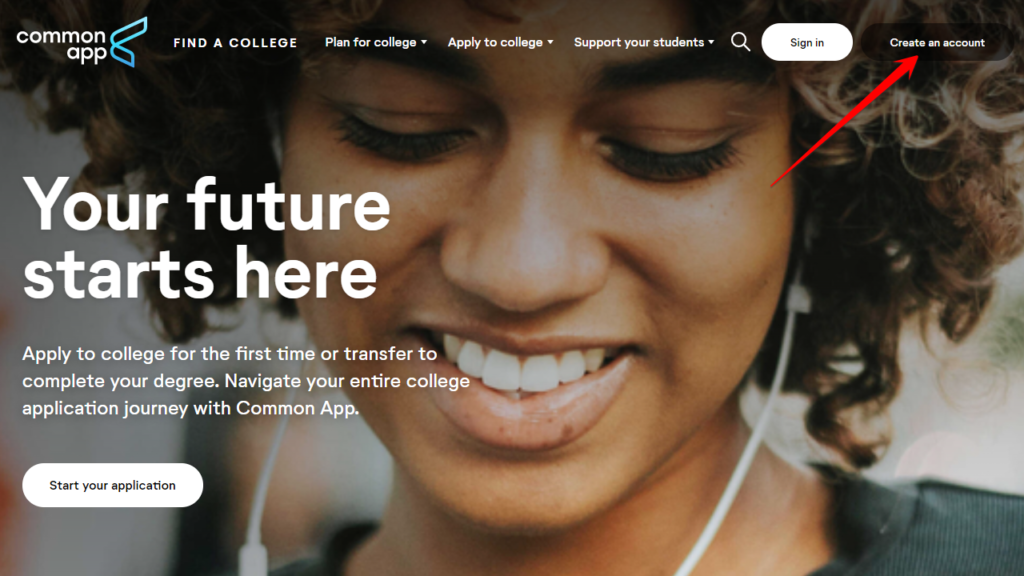
Before we move further, If you’d like to watch a tutorial instead of following pictures, You definitely love to follow my video tutorial on applying for the Common App Fee Waiver. Check down below 👇.
Step 2: Go to the Profile Section on Your Common App.
Once you’ve registered, go to the Common App Section and Select the Profile Section from the navigation options on the left.
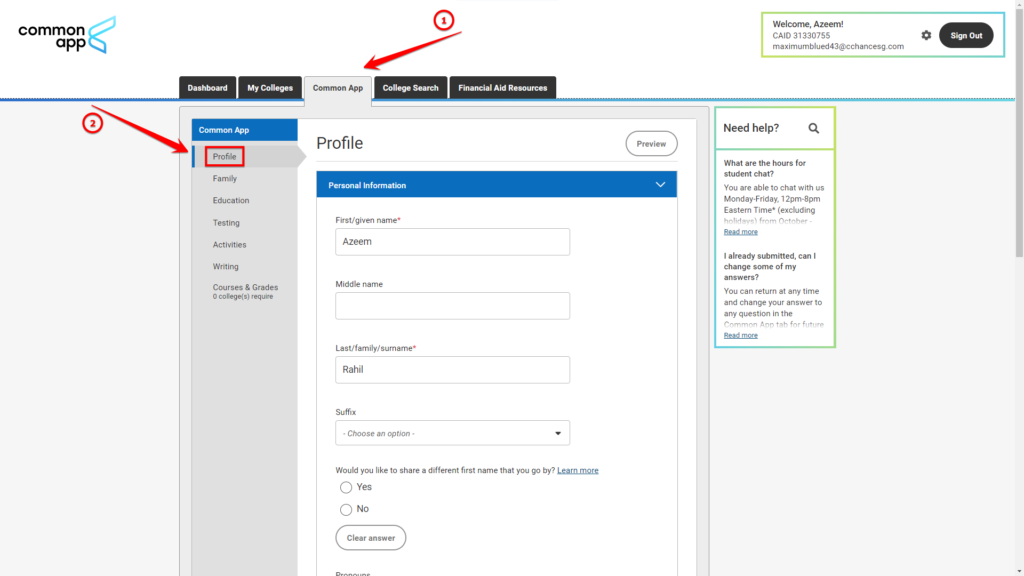
Step 3: Select the ‘Common App Fee Waiver’ Sub-Section.
In the Profile section, scroll down and select the sub-section ‘Common App Fee Waiver’ under the ‘Geography and Nationality’ sub-section.
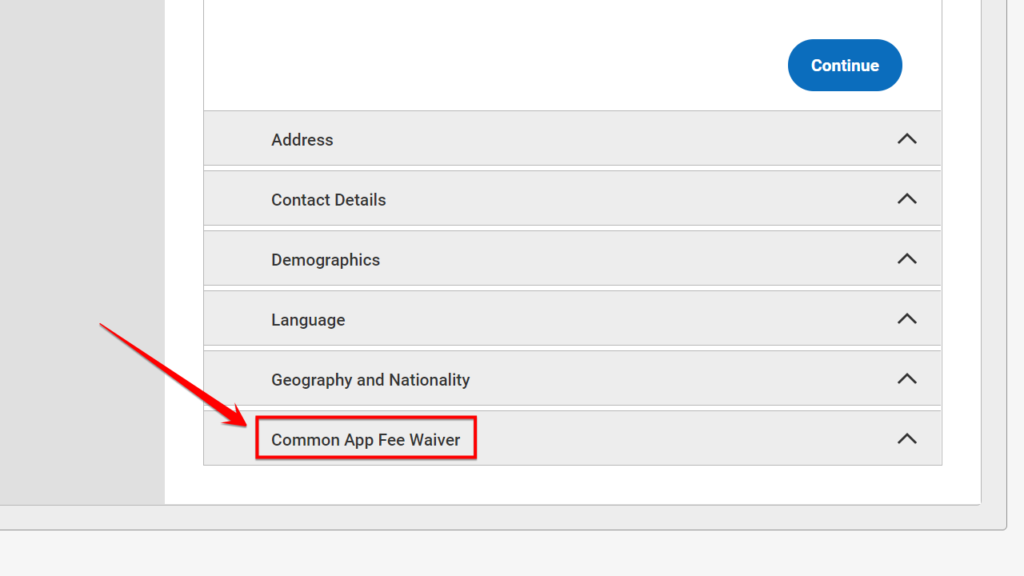
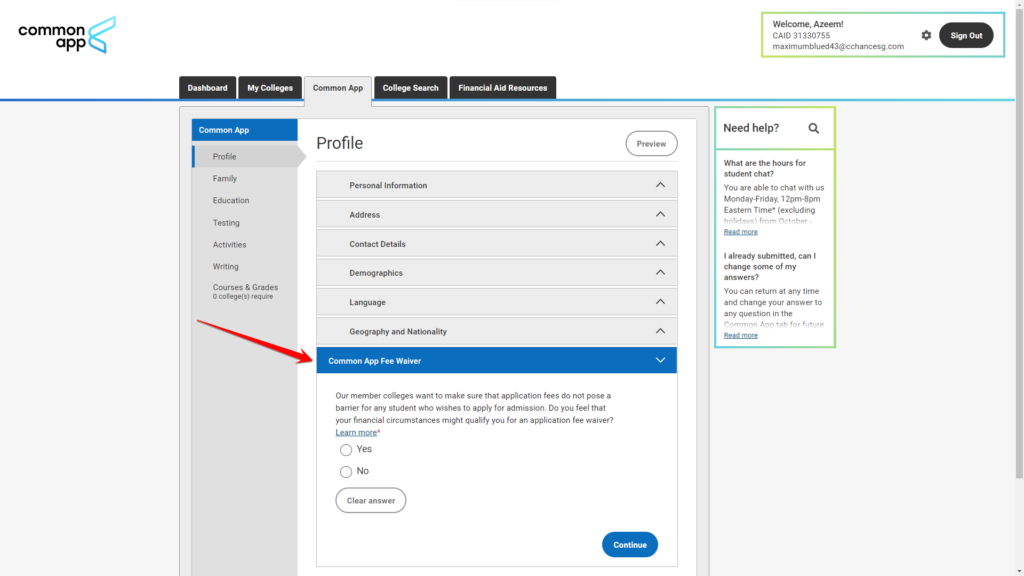
Here it says that
Our member colleges want to make sure that application fees do not pose a barrier for any student who wishes to apply for admission. Do you feel that your financial circumstances might qualify you for an application fee waiver? YES or NO.
Common App Fee Waiver Question
Click on the “Yes” Option that, Yes, you’d like to request the Common App Fee Waiver.
Step 4: Select the Eligibility Criteria that Apply to you and Sign.
Once you say “Yes,” a number of eligibility criteria or ‘indicators of economic need‘ will pop up. Select at least one of the eight eligibility criteria which apply to you.
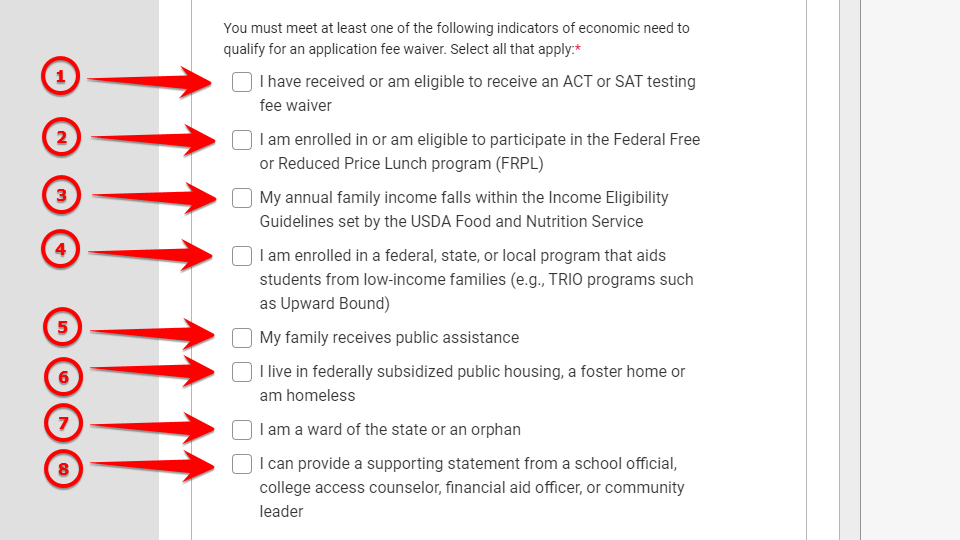
I’ve already explained you all the eligibility criteria in detail and so, accordingly select the indicators which apply to you. I would like to reiterate that it is better and safer to chose the last option if you can manage to get a supporting statement upon any university’s request than to chose the other statements that specifically apply to U.S. residents and are ambiguous for international students.
I chose the last eligibility criteria:
I can provide a supporting statement from a school official, college access counselor, financial aid officer, or community leader.
Eighth Eligibility Criteria for the Common App Fee Waiver
Now, once you chose the criteria that best applies to you, go ahead and type your full name in the Signature box to sign electronically and certify your request for the Common App Fee Waiver.
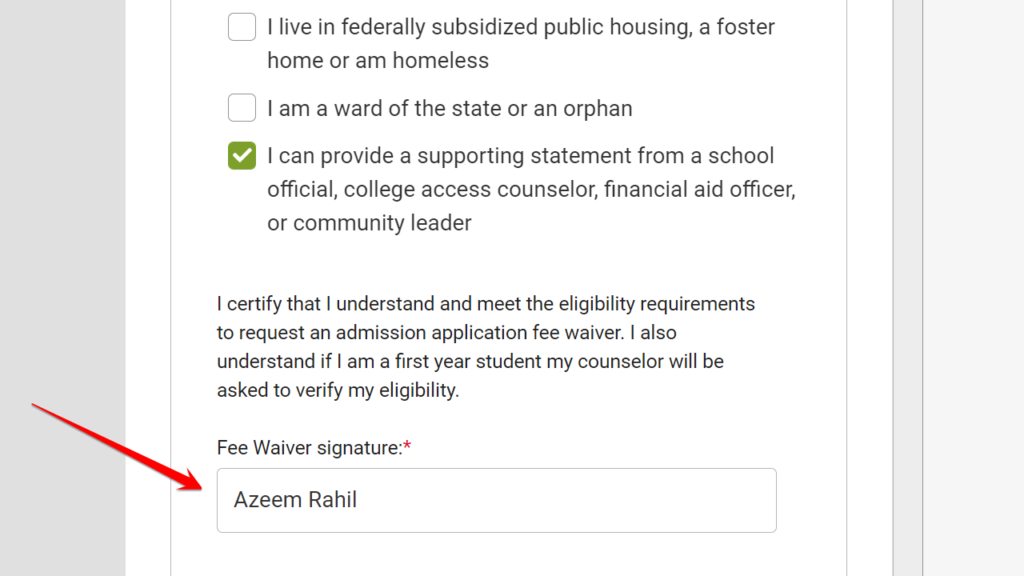
Step 5: Skip the Last Question and Click on “Continue”.
Lastly, you’ll have to skip the last question if you’re an international student as the last question is only for US Residents and click on “Continue.”
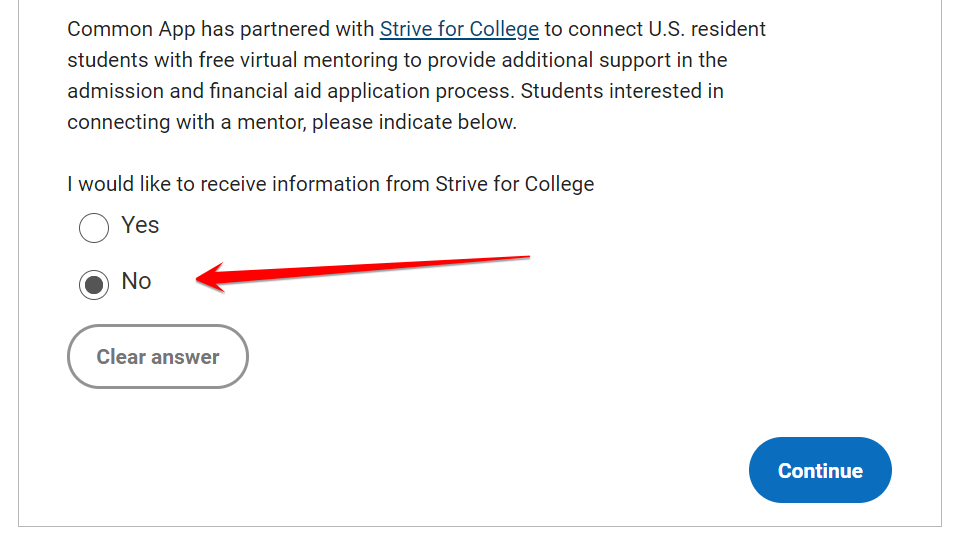
And that’s it, this is how you request the Common App Fee Waiver and once you request it here, it applies to all the colleges on your college list and you don’t have to repeat it again and again for every college on your list.
On your Common App you’ve done your part, but the Common App Fee Waiver request isn’t fulfilled until your counselor confirms your answer by completing the exact same process on their Common App.
Now, I’ll show you how your counselor need to fill out and verify your Common App Fee Waiver Request. I am showing the counselor part with a fake account to make you guys aware of what a counselor needs to do to successfully verify the Common App Fee Waiver request because a lot of students have counselors who do not know how to complete the process and some students do not even have a counselor and they have to ask their school teacher or principal to complete the school counselor section for them.
So if your counselor or school official doesn’t know much about navigating and filling out the Common App Fee Waiver Section, be sure to let them know about it.
Step 6: Invite Your School Counselor or School Official on the Common App.
Before being able to invite recommenders on the Common App, you’ll need to add at least one college on your Common App College List.
To do this, You’ll need to go to the College Search Section, type in the name of the universities you’re applying to and add them to your College List. Let’s say you want to apply to Princeton University, type it’s name in the box and click on the plus sign to add it 👇.
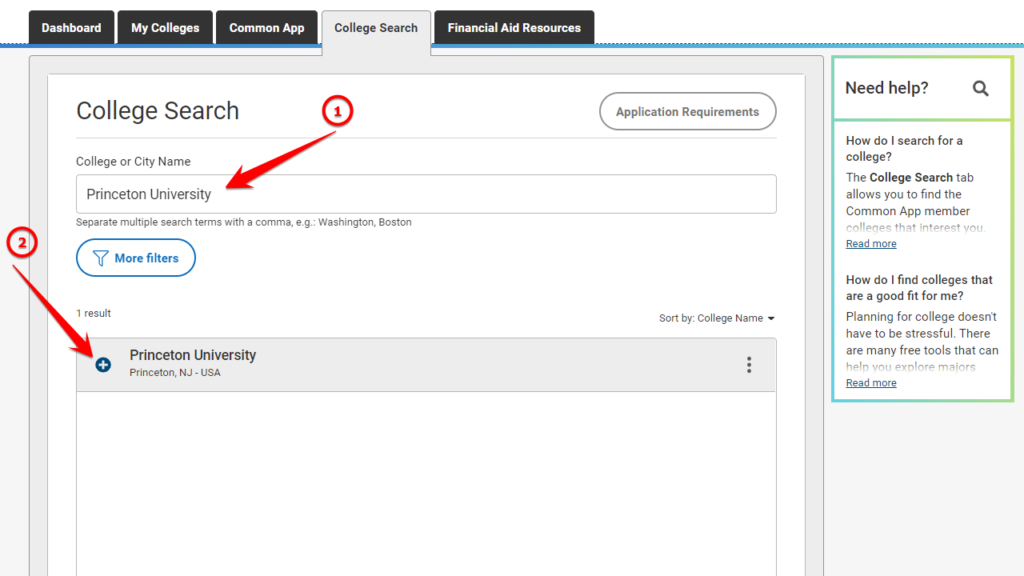
Once you’ve added the it to your College List, Go to My Colleges, Click on Princeton University.
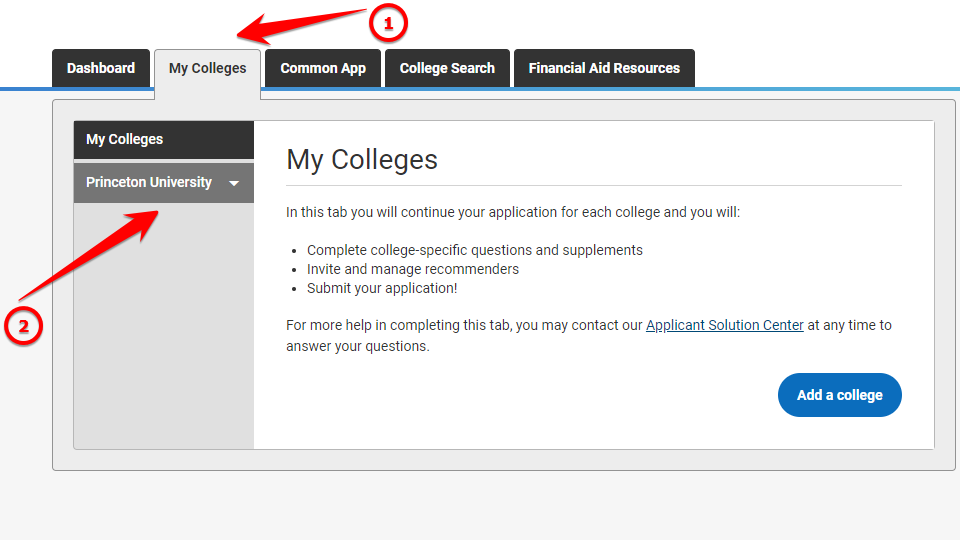
Now, on the left, go to Recommenders and FERPA section and now you’ll see a small notice which says that 👇
Before you can invite your counselor, teacher, recommenders, parents, or advisors, you must complete the Family Education Rights and Privacy Act (FERPA) release authorization process.
Common App Recommenders Section
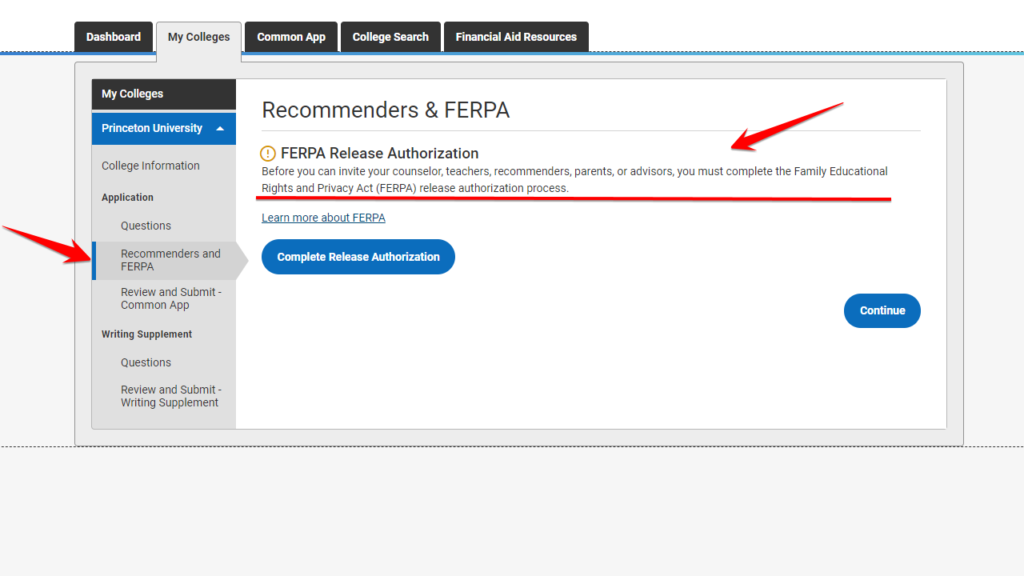
Step 7: Complete the FERPA Release Authorization.
Now, if you don’t know much about FERPA let me explain this to you in brief.
FERPA is a student privacy law in the United States which gives students and their parents the right to access and see all of the student’s education records and that includes all the applications submitted to the universities. In short, through this law, you will be able to review everything your counselors and teachers submit to colleges including the letter of recommendations.
But that’s not the whole picture, you have the option to give up your right so you can never see what your teachers submit to colleges. Now you might be thinking, why will anyone give up this right, who doesn’t want to see what their teachers write about them?
Now, some teachers and school counselors do not write Letter of Recommendation for a student who hasn’t waived their FERPA right because when the student enters the university, they will be able to see the LOR using their FERPA right.
In the FERPA release Authorization, Common App asks you whether you want to waive your FERPA right or don’t want to waive it. Waiving your FERPA right means that you gave up your right to review your confidential documents and will never be able to view what your counselor submits, only if, the counselor doesn’t want show it to you.
If your counselor and school teachers are comfortable sharing your Letter of Recommendation, there is no problem in doing that and you’ll be able to see all your LORs, but then too I would recommend you to WAIVE this right because if you waive your right, colleges see that you’ve waived your right and that your counselor and school teacher can write whatever they want in the LOR without any pressure since you’ve waived your right and will never be able to read or review what they submit.
Waiving this right will increase the authenticity of your LORs in the eyes of the admission officers and will let them feel that the LORs are in fact open and truthful.
Alright, so in order to invite our counselor, let’s first complete the FERPA authorization.
Click on the ‘Complete Release Authorization’. A pop appears over here and in this you’ll find more information about the this law, so make sure you go over it before proceeding further.
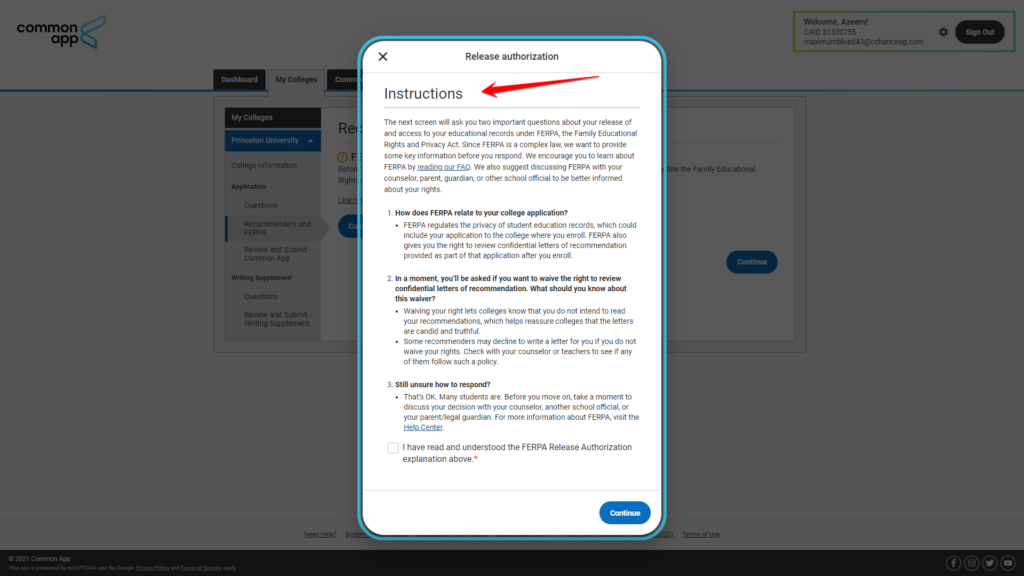
When you’re done reading, scroll down. Check the option “I have read and understood the FERPA Release Authorization above” and Click on the “Continue” Button.
Now, down below 👇, you can see another option pops up. Basically, it says that you acknowledge and understand that your school can release all of your education records required by the universities and that the universities can review them and contact the school if they have any question or want more information.
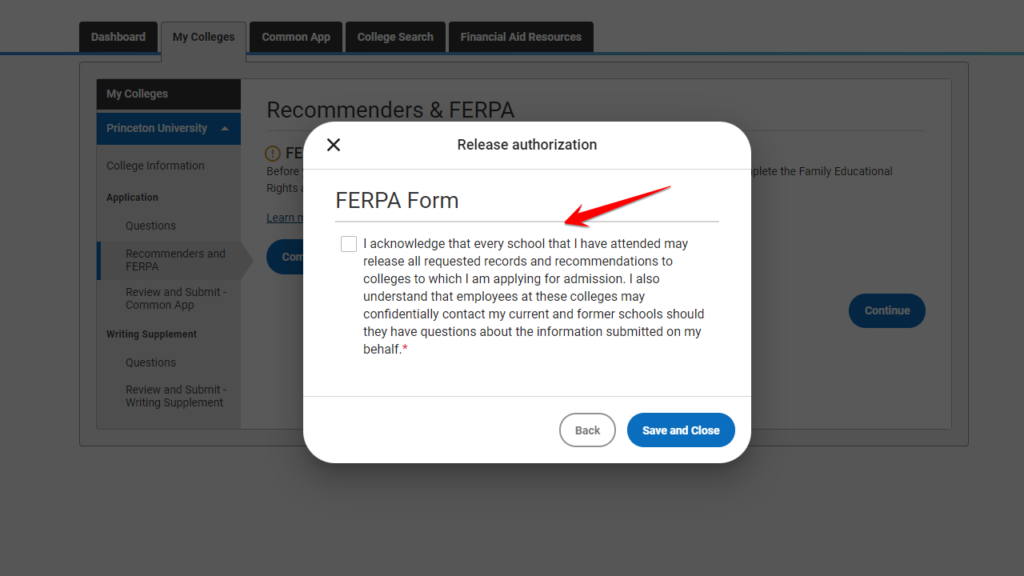
Check this option as well and scroll down to see the waiving options. You can either waive your right or not waive it according to your choice. I suggest you waive it.
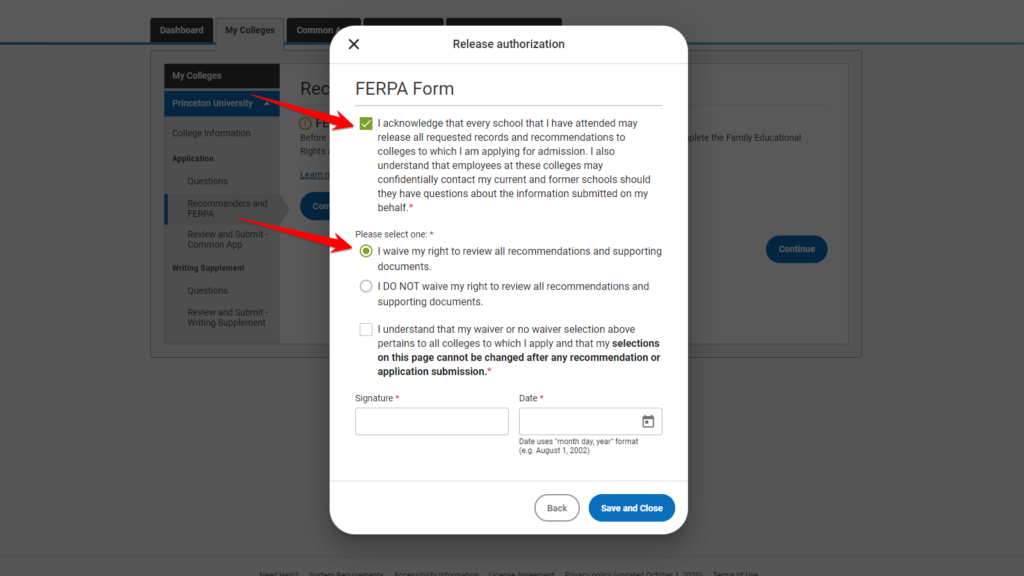
The last option says that this authorization will apply to all the universities and colleges on the College List (My Colleges Section) and that you cannot change your decision of waiving or not waiving once any teacher or counselor submits their recommendation or you submit your application to any university.
Basically, you can only complete the authorization once, so be sure to fill this carefully. Check the option.
Now, you can type your full name in the Signature Box and Select the Date of the day you’re completing that authorization. Click on Save and Close and you’re done.
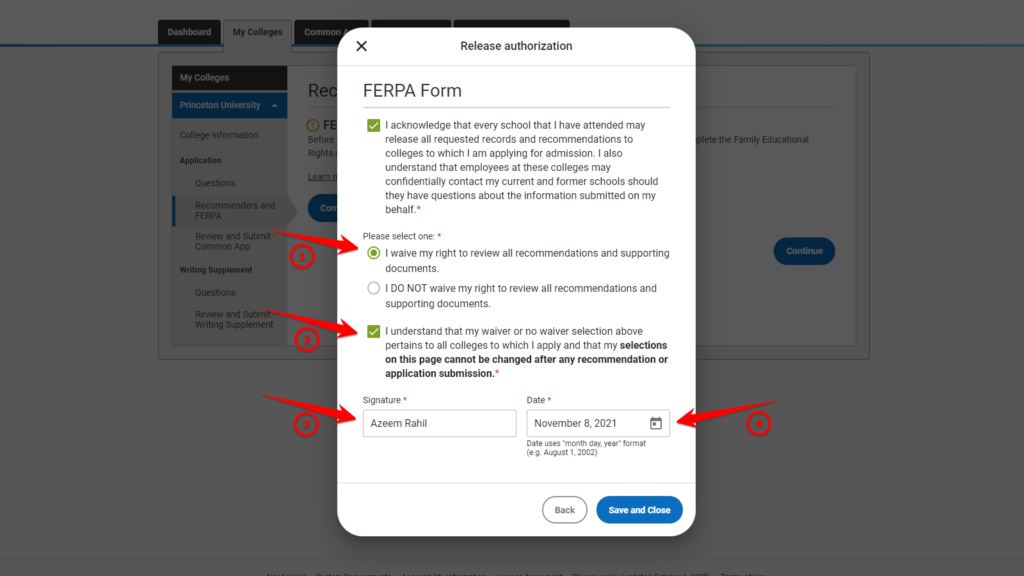
This will unlock the options to Invite Counselor, School Teachers, Parent, Advisors etc.
For now, I’ll invite a counselor: type in their email address, full name, last name, title. BOOM! they will be sent an invitation to submit the school documents, LOR as well as complete the Common App Fee Waiver Verification.
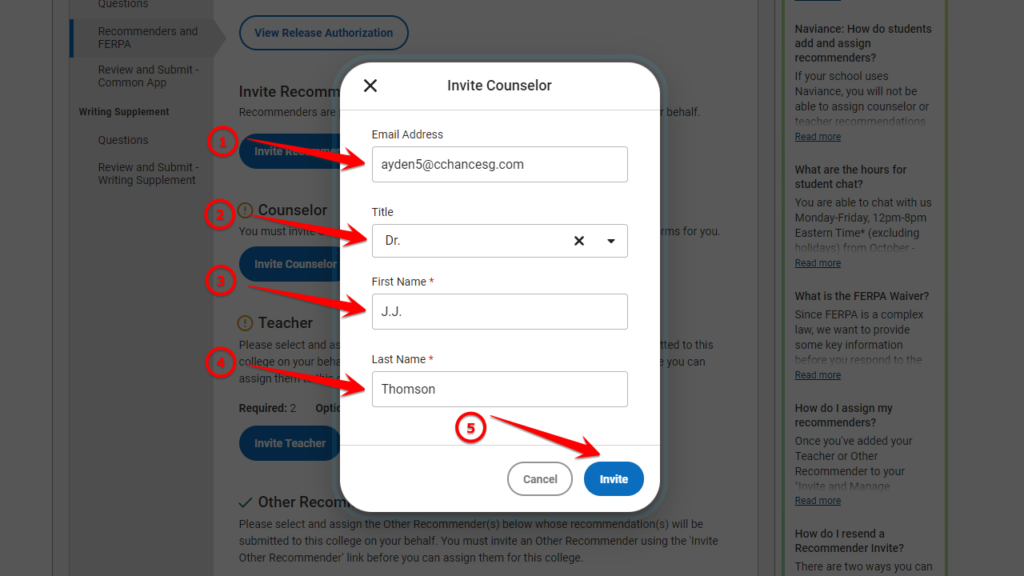
Step 8: Ask your Counselor to Setup the Common App Account.
Once you send the invitation, your counselor or school teacher will receive an email telling them that they are invited on the Common App and then they can click on the link to activate their Common App Account.
Once the account is setup, your counselor’s Common App Dashboard will look something like this 👇. Now, all of the students who have invited the counselor will appear on the main page and your counselor needs to click on your name to complete the documentation.
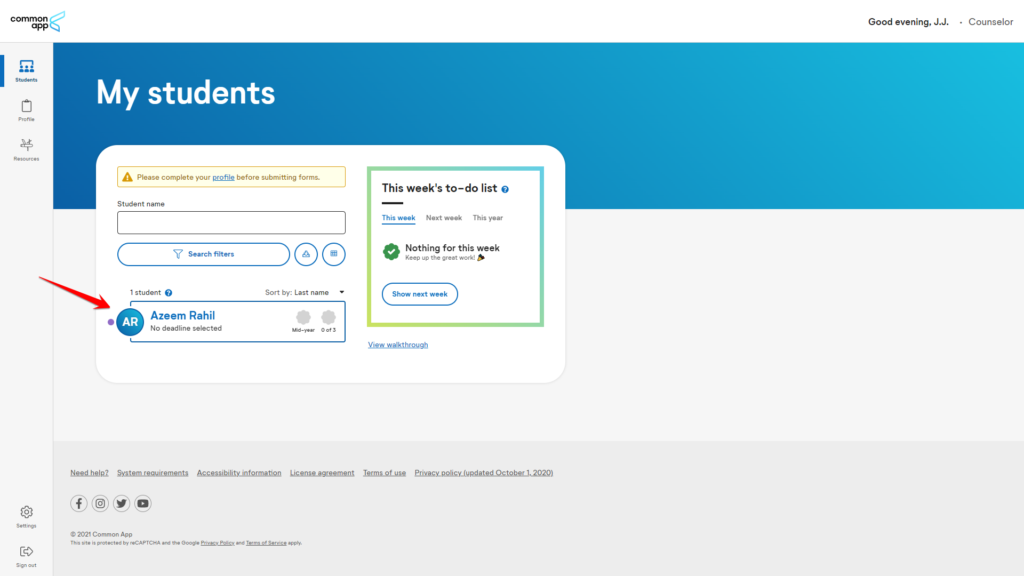
Clicking on the student’s name will open their profile and the number of options that will show up on the left depends on the colleges you’ve chosen and their specific requirements. For instance, if you chose to apply Early Decision to a college, an early decision agreement will also show up here.
Step 9: Ask Your Counselor to Click on the Fee Waiver Option and Choose the Right Criteria to Verify the Student’s Need.
Once your counselor clicks on the student’s name, they can complete all of the documentation for that student. In order to complete the Fee Waiver, the counselor needs to click on the Fee Waiver option on the left and choose the right eligibility criteria or indicators of economic need that verify the student’s financial circumstances.
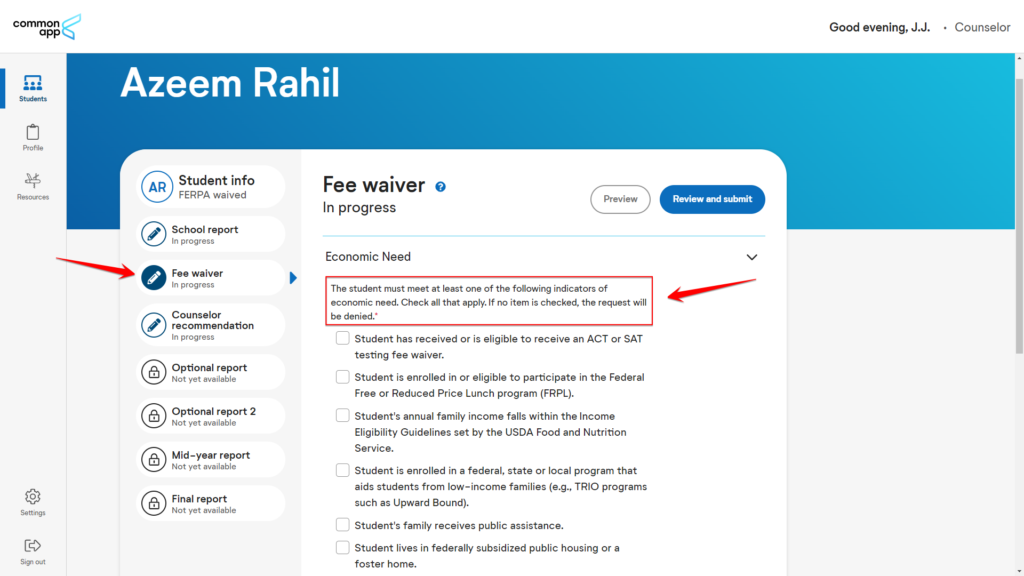
A really important thing to note here is the following statement:
The student must meet at least one of the following indicators of economic need. Check all that apply. If no item is checked, the request will be denied.
Counselor’s Fee Waiver Question on Common App
Now, all of these options or ‘indicators of economic need’ are basically the eligibility criteria for the Common App Fee Waiver and it is extremely important for your counselor to not just choose at least one option from the eight eligibility criteria but to also choose the right option for you.
Therefore, if your counselor is filling out the common app for the first time or they don’t know much about the Fee waiver, do let them know what they are supposed to do (step-by-step) because in case if your counselor messes this section up or they skip this section, your fee waiver request will get rejected and you’ll have no other option but to pay the application fee for all the universities you’re applying to.
As you all know, I didn’t have a school counselor and so when I sent the Counselor invitation to my School Principal, I called him and explained everything to him. In fact, I even went on to conduct a Google Meet with him and explain him all of the Fee Waiver options on the Common App so he can complete it in the right manner. If you can arrange an online or offline meeting with your counselor, I highly recommend you conduct one, so you and your counselor can complete the requirements in the right way.
As I said before, most of these indicators only apply to US residents, therefore, to be on the safe side, I would suggest you to ask your counselor to chose the last option and this is the option my counselor chose when he completed my Common App Fee Waiver. It says.
Given my knowledge of this student’s family circumstances and after reviewing the eligibility guidelines, I believe that providing the application fee would present a hardship.”
Last Eligibility Criterion the Common App Fee Waiver Section
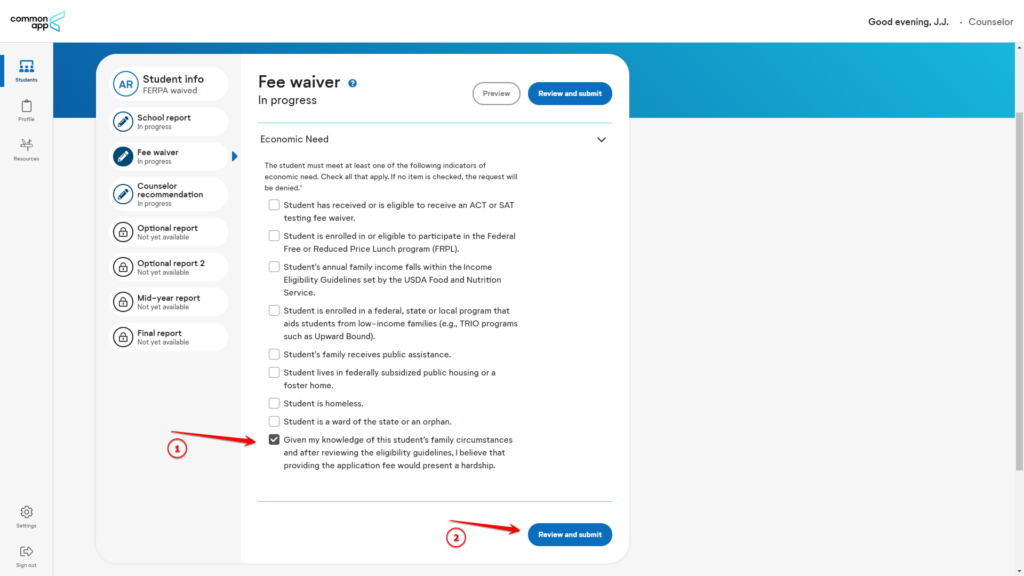
Once your counselor checks all the options that apply or at least one option that applies to you, they’ll need to click on Review and Submit.
Step 10: Ask your Counselor to Sign and Submit the Fee Waiver Request.
Now, once your counselor clicks the Review and Submit button, it will open a few more options, the first one says that this form or the Common App Fee Waiver criteria that the counselor just filled is applicable for all institutions on the student’s College list and the counselor will not be able to edit or change anything after its submission.
So yea, your counselor needs to read this and check it.
Once its checked, they’ll need to electronically sign and certify the request by typing their full name.
Lastly, your counselor needs to select the Date of that day and hit the Submit Button.
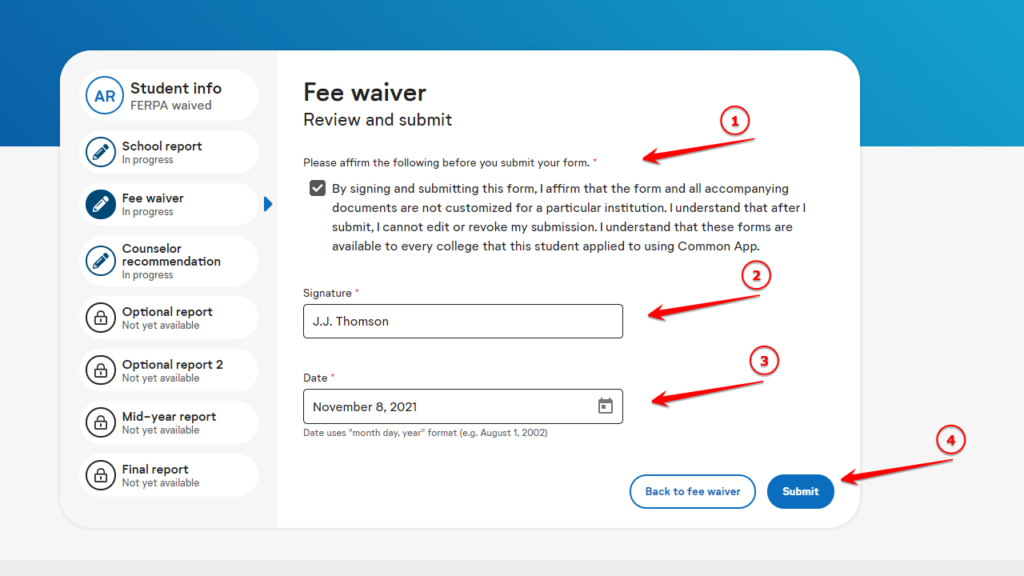
And that’s it, you and you’re counselor have successfully requested the Common App Fee Waiver and a Green Check Box will appear beside the Fee Waiver section on your Counselor’s common app indicating that the Fee Waiver Section is completed.
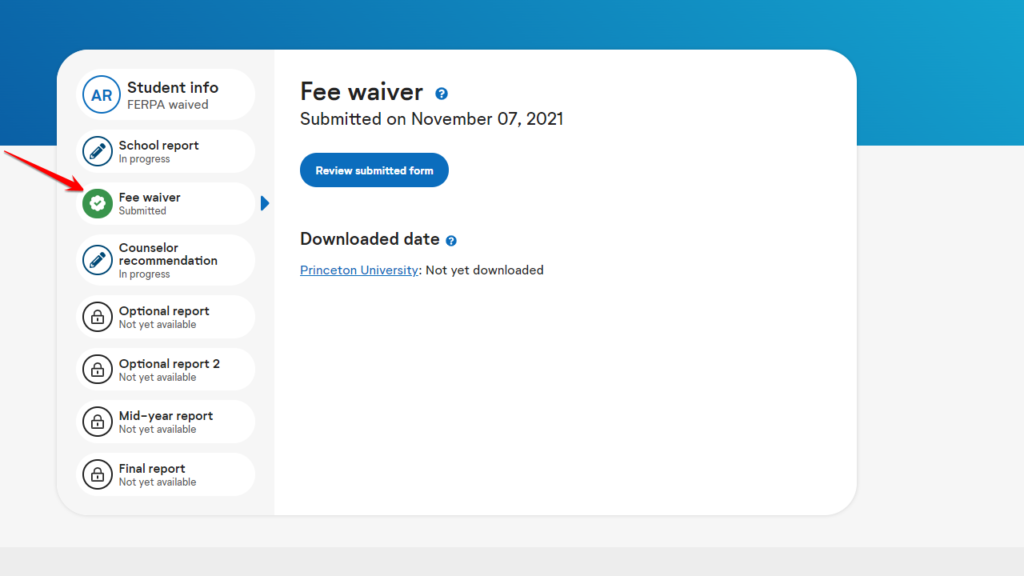
Now, after you completed your fee waiver request and you start submitting your application to the universities, you’ll easily be able to bypass the payment section without paying a cent as you’ll automatically get jumped to the review section, where you can go over your entire application, review it, type your signature and submit it.
As long as you’re a student in need and you genuinely meet the eligibility criteria, there is no need to worry about the application fee for all the universities or colleges you’ll be applying to if you’ve filled the Common App Fee Waiver.
MIT Application Fee Waiver
Now, guys I want to share one a bad news, if you’re planning to apply to MIT, which is that MIT is not on the Common App which means that Common App Fee Waiver isn’t available if you’re applying to MIT, but the good news is that MIT has its own Application Fee Waiver on its OWN application portal. Let me tell you how you can get that too.
Once you create an account to apply at MIT, your dashboard will look something like this.
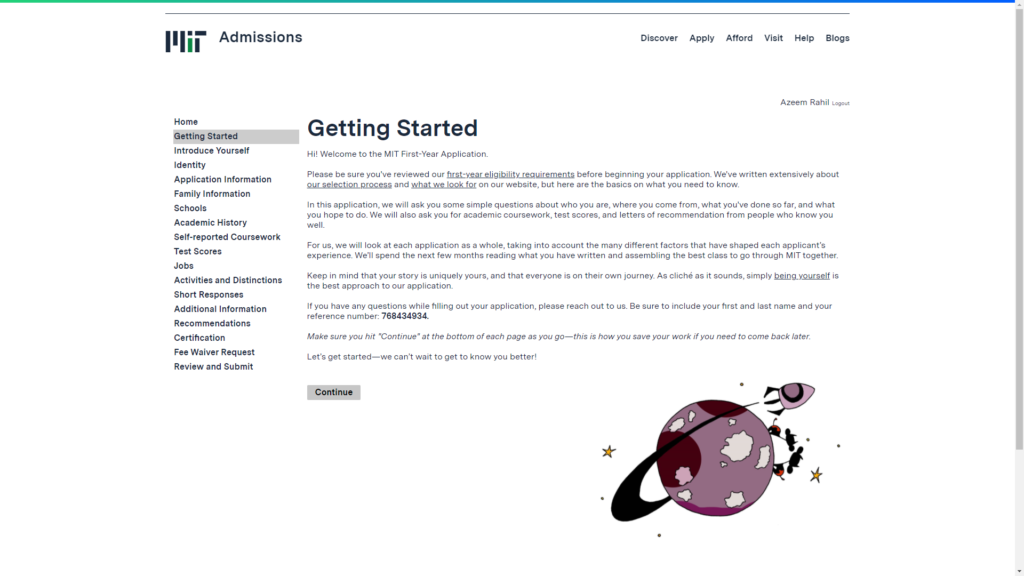
On the left, head over to the Fee Waiver Request Section and here you can see that, it says
The application fee of $75 is payable online with a credit card.
We understand that paying college application fees presents a hardship for many families. Fee waivers are available for both domestic and international applicants. MIT practices need-blind admissions, so requesting a fee waiver will not have any negative impact on your chances of admission.
Would you like to request a fee waiver? Yes or No.
MIT Fee Waiver Request Question
If you’d like to request a fee waiver as it might be a hardship for you, go ahead and check YES.
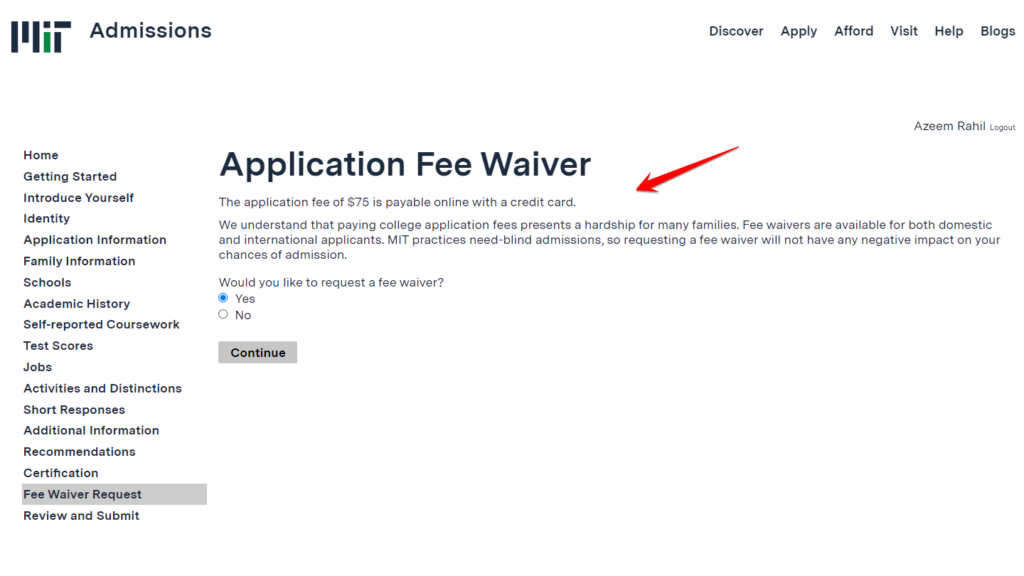
And you’re done, it is as simple as that. There is no formality of counselor verifying your request or the university not accepting your fee waiver, just clicking yes on this question will, in 99% of the cases, guarantee you an application fee waiver.
No before I end this video, I would like to clear one more question which is present in the minds of a lot of students, that is “Should I apply for Common App Fee Waiver and other school specific fee waiver or not?”
And the simple answer to this is to ask yourself whether applying to colleges through the Common app will cause a financial strain on your family, if YES, just go ahead and apply. The good news is that most students from the developing countries easily get fee waivers not just on Common App but for CSS Profile and other components of the application at most universities because even if you belong to a good earning household, the average household income in developing nations is far less than that of U.S. households.
If you loved reading this post, you’ll also love my post on the 56 Fully Funded Scholarships for International Students in U.S., UK, Australia, New Zealand, Canada and Europe. Do check it out as well, if you’re interested in studying abroad for free.
Check Here 👉: 50+ Fully Funded Scholarships for International Students to Study Abroad for Free
Thanks
By the way, I will soon be writing a post on CSS Profile Fee Waiver and show you the exact breakdown of my expenses when I applied to twelve universities in the US from sending test scores to submitting financial aid applications. So do Subscribe my YouTube Channel and stay tuned for it.
Also guys do share this post with your friends, relatives, or even your counselor or school teacher who might benefit from it.
I hope you receive the Common App Fee Waiver and if you have any question or suggestion, do let me know in the comments below.
Ok, Thank you so much for reading till the end.
See you Soon. Byeeeeeee.
Good Bye and Take Care.






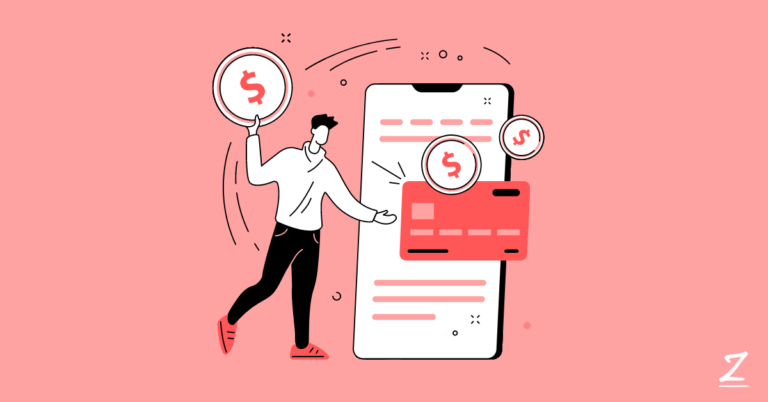
Actually I was unaware of lots of things but this page has opened my mind currently I have known lots of things Actually thanks a lot Zohairansari ‘s system it’s much helpful
Glad it was helpful.
Thanks for marking the required fields
You’re Welcome.
the special-forward help is one of the few thing i’ve ever seen in my life;there is no denying to say it as a way-guider on the way of reaching out to the university of our future-mind
Thanks
totally amazing………Thank you sooooooooooooooooo much this effort, brother.
You’re welcome. Glad it was helpful.
HI, Zohair Ansari, incredible work.
I can see u put up lot and lot of time with complete dedication and tried to give all the details, for anyone applying. Thanks zohair and all the best to you
thank you so much! 🙂
Wow!……. It gave a little hope, I have to try ! 👏
I cant express how helpful this was, all thanks to you and I wish you everything best!!!
It was really helpful